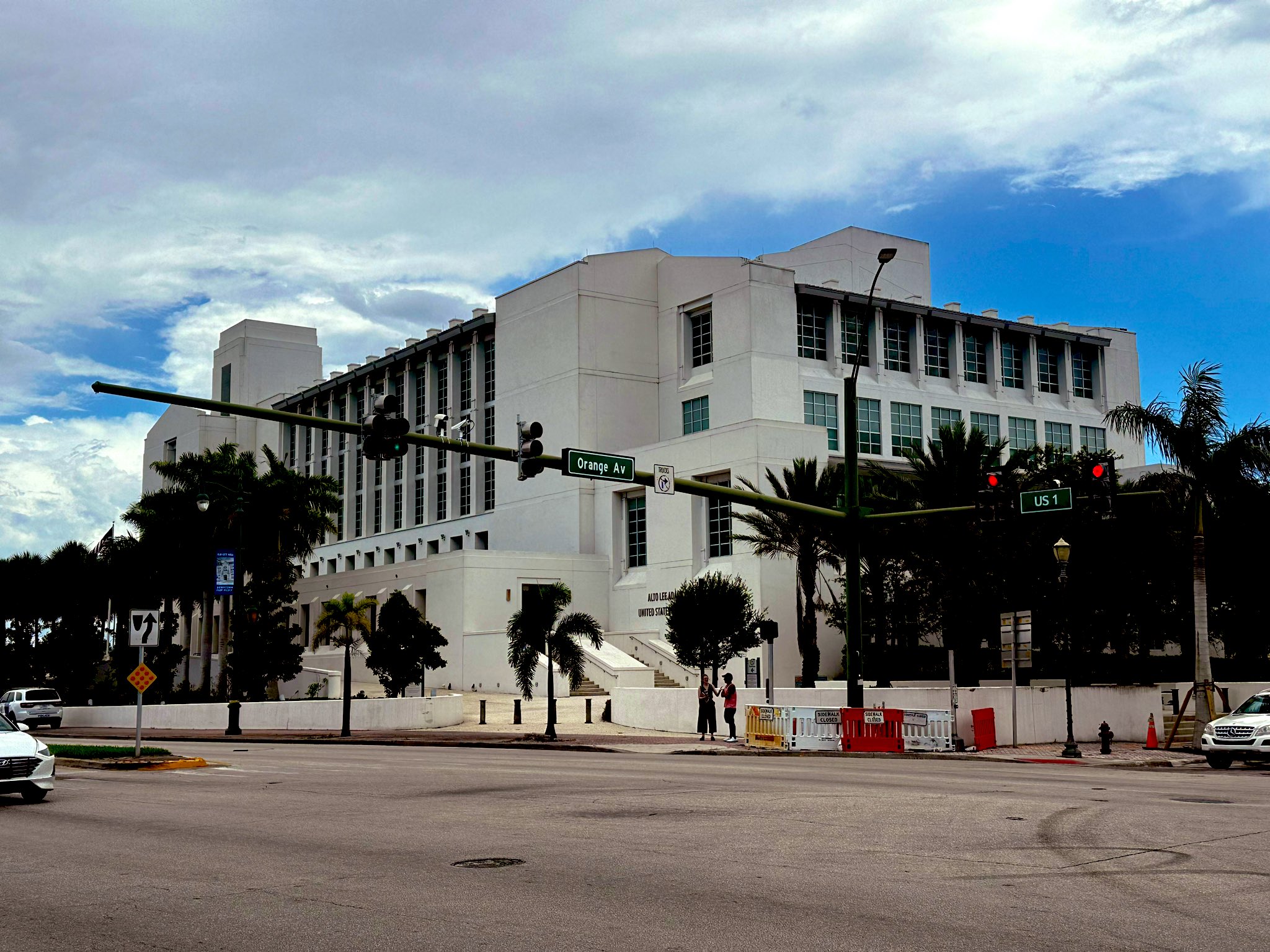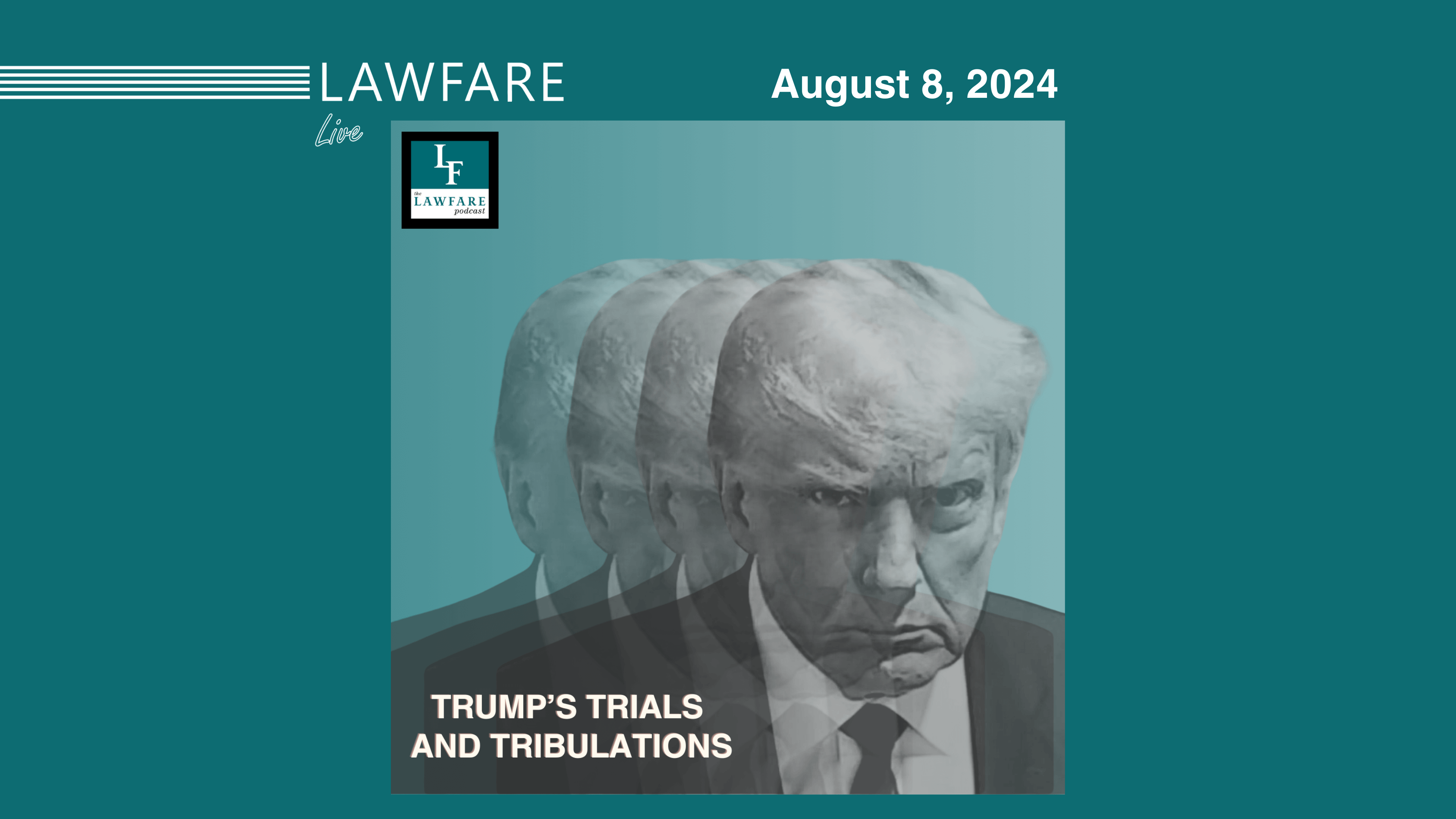Today's Headlines and Commentary
The FBI arrested an NSA contractor in August and is now investigating whether he stole and disclosed classified documents from the agency, the New York Times reports. Harold T. Martin III, a Booz Allen employee, was charged with theft of government property and unauthorized removal or retention of classified documents after the FBI discovered both hard copy and digital information during a search of his house.
Published by The Lawfare Institute
in Cooperation With

The FBI arrested an NSA contractor in August and is now investigating whether he stole and disclosed classified documents from the agency, the New York Times reports. Harold T. Martin III, a Booz Allen employee, was charged with theft of government property and unauthorized removal or retention of classified documents after the FBI discovered both hard copy and digital information during a search of his house. Martin is suspected of having stolen “source code” used by NSA to breach the computer systems of foreign governments. It remains unclear whether Martin’s case is connected to the recent “Shadow Brokers” disclosures of NSA information.
Aleppo will likely fall soon, but the conflict in Syria will continue, writes Reuters. As Syrian rebel groups lose territorial control, the nature of the war will likely shift to a protracted insurgency with guerilla tactics. Russian and Iranian military assistance has been vital to bolstering the Syrian regime and helping it reassert its territorial control.
Why is Russia so aggressively supporting the Syrian regime’s renewed offensive? Because the Kremlin believes it has a window of opportunity to act without fear of significant U.S. escalation in Syria until the next president enters office, argues the New York Times. If the Syrian government can expand its territorial control—including in the vital urban center of Aleppo—before the end of the Obama administration, it will have a much stronger bargaining position with the next president. In the meantime, the Kremlin calculates that President Obama is unlikely to expand U.S. intervention into the conflict, giving the Russian and Syrian militaries leeway to intensify their operations.
The vice presidential debate last night shed some light on what the next president may do to manage the conflict in Syria, writes the Times. Both Senator Tim Kaine and Governor Mike Pence favored greater American involvement in the conflict, specifically supporting the establishment of humanitarian “safe zones.” In a break with his running mate Donald Trump, Governor Pence also called for a potential no-fly zone and for strikes in Syrian regime forces targeting civilians.
A U.N. expert in satellite imagery determined that the attack on a U.N. aid convoy last month was an airstrike—not rebel artillery or a fire on the ground, as Russian officials variously claimed. The expert cited the size and type of crater seen in the imagery as belonging to “air dropped munitions.” The information is unlikely to change the dialogue on the issue, as the United States still maintains that the Russian and/or Syrian air forces were responsible, while Russia blames a drone piloted by the U.S.-led coalition. Reuters has more.
U.S. Secretary of State John Kerry criticized Russia yesterday for its bloody intervention in Syria, but also alluded to the possibility of a future dialogue on the conflict after this week’s announcement that the Obama administration was ending U.S.-Russian negotiations on a new ceasefire, reports the Wall Street Journal.
Tensions between Turkey and Iraq have flared after the Turkish government voted last week to keep its military presence in Iraq for an additional year, Reuters writes. The 2,000 Turkish troops based in northern Iraq are training Kurdish peshmerga and and Sunni militias. Turkey insists that the regional Kurdish government solicited military assistance, while the Iraqi central government counters that it does not accept their presence as legitimate. Iraqi Prime Minister Haider al-Abadi threatened that continued Turkish occupation “could turn into a regional war.”
Turkish authorities are continuing an expansive internal crackdown following this summer’s coup attempt, Reuters observes. The government announced a three-month extension of the post-coup state of emergency yesterday, preserving President Recep Tayyip Erdogan’s enhanced executive authority. Authorities announced the arrest of 55 military and intelligence personnel for alleged ties to Fethullah Gulen, the cleric that President Erdogan accuses of orchestrating the failed coup.
Egyptian President Abdel Fattah al-Sisi is expanding the military’s role in his nation’s struggling economy, reports the Financial Times. Sisi’s latest endeavour used the army to distribute subsidized baby milk after private vendors faced shortages. Some are criticizing the president on the grounds that the military’s involvement in the economy could have adverse effects for the private sector.
Israel responded to a rocket strike on an Israeli town with at least nine airstrikes against Hamas in the Gaza Strip. An ISIS-inspired militant group called the Grandsons of the Companions claimed responsibility for the attack, which notably made it past Israel’s Iron Dome missile defense system. The AP has more.
A rocket attack in Yemeni city of Taiz killed 10 civilians, the AP notes. The incident took place in an area that Houthi forces have laid siege to for almost a year.
Iran warned Saudi Arabia to keep its naval forces drilling in the Gulf far away from Iranian territorial waters, Reuters writes. The warning comes after a series of provocative naval incidents between Iranian and American naval vessels in the Persian Gulf.
The Islamic State has claimed responsibility for the death of an American service member in Afghanistan, Reuters reports. The Pentagon announced yesterday that the service member had been killed by an IED during an operation against the Islamic State’s Afghanistan presence, but did not attribute responsibility.
Following coordinated Taliban offensives across Afghanistan earlier this week, the Afghan government has secured an international commitment to provide the country with $3 billion in development aid annually. The total does not include the annual $4 billion in security assistance that NATO provides Afghanistan. Three days earlier, Afghanistan agreed to a deal with the European Union to accept the return of refugees and migrants who were denied asylum. E.U. officials claim the two international agreements are unrelated. The Journal has more.
The Russian military is becoming not only more active but also more sophisticated, argues the Journal. Norwegian officials report that Russian military operations in the Arctic suggest that the Kremlin’s modernization is allowing Russia to catch up to the West “with new sensors, submarines, and capabilities.” These capabilities raise questions about whether NATO needs to do more to deter Russian military action.
Chinese President Xi Jinping appears to be delaying his choice of a successor until after a Communist Party conference in late 2017, indicating that he may plan to stay in office beyond the traditional two terms. The Times reports on the uncertainty among Chinese elites at Xi’s decision to break with precedent and begin his second term in office without a clear successor, which is likely to magnify political infighting and friction within the Chinese Communist Party.
Amidst concern over increased Chinese investment in the U.S., the Government Accountability Office will examine whether to expand the authority of the Committee on Foreign Investment in the United States to review foreign business ventures in the United States. The GAO review will respond to a letter from members of Congress who voiced doubts about the security implications of recent Russian and Chinese investments.
Former Portuguese Prime Minister António Guterres will be the next U.N. Secretary General, the Times writes. Russia’s U.N. ambassador announced that Guterres, who previously served as the U.N. high commissioner for refugees from 2005 to 2015, was the clear favorite of a divided Security Council. Guterres’ appointment must still be finalized by a formal vote by the Security Council on Thursday and then by a vote of the General Assembly.
Two policemen were stabbed this morning in Brussels in what authorities say was likely a terror attack, the BBC reports. The attacker has been arrested and identified as a former Belgian army officer who may have links to militant Islamists who traveled to Syria to fight alongside ISIS.
Negotiations continue in Colombia in an effort to salvage the long-awaited peace deal between the government and the FARC guerrilla group, which a slim majority of Colombians rejected in a referendum on Sunday. The AP tells us that Colombian President Juan Manuel Santos has extended the ceasefire with FARC until October 31st and is holding separate talks with both FARC negotiators and former president Álvaro Uribe, who campaigned against the scuppered peace agreement on the grounds that it was too lenient to FARC.
The United States is collaborating with 40 countries on export control regulations for weaponized drones. The export rules would not cover unarmed drones, such as those used for reconnaissance or for private sector applications. Notably, the Israelis, Chinese, and Russians have not endorsed the export principles. Bloomberg has more.
ICYMI: Yesterday, on Lawfare
Jack Goldsmith and Benjamin Wittes announced the Hoover Book Soiree, which will feature David Priess’ new book on the history of presidential intelligence briefings.
Bruce Riedel outlined how JASTA will impact U.S.-Saudi relations.
Stephanie Leutert analyzed Colombia’s vote to reject the peace agreement with the FARC.
Michael Price explored the search and seizure controversies surrounding digital evidence.
Rita Siemion called for the moderator in last night’s debate to ask the vice presidential candidates about their stances on a new AUMF to fight ISIS.
J. Dana Stuster updated the Middle East Ticker, discussing the Islamic State, the conflict in Syria, Shimon Peres, and JASTA.
Email the Roundup Team noteworthy law and security-related articles to include, and follow us on Twitter and Facebook for additional commentary on these issues.Sign up to receive Lawfare in your inbox. Visit our Events Calendar to learn about upcoming national security events, and check out relevant job openings on our Job Board.





.jpg?sfvrsn=6b10cf8f_5)
